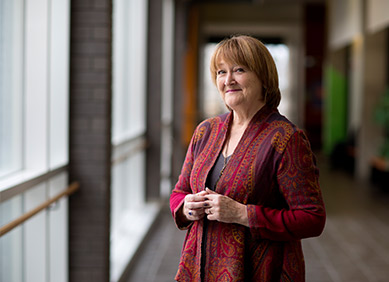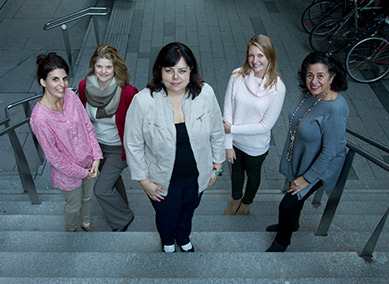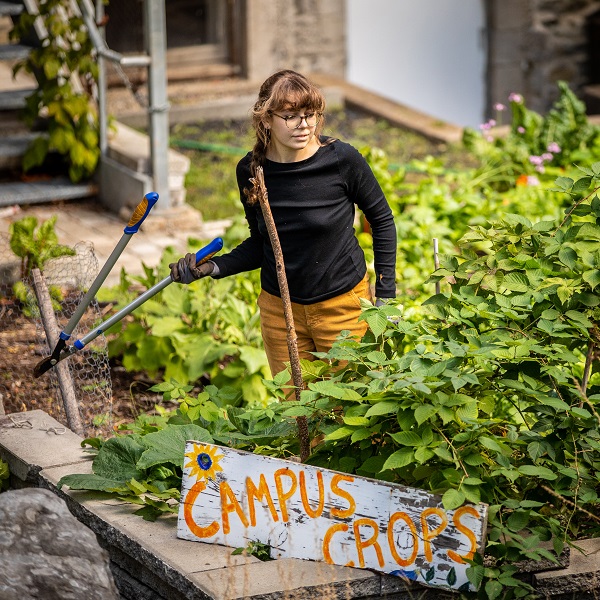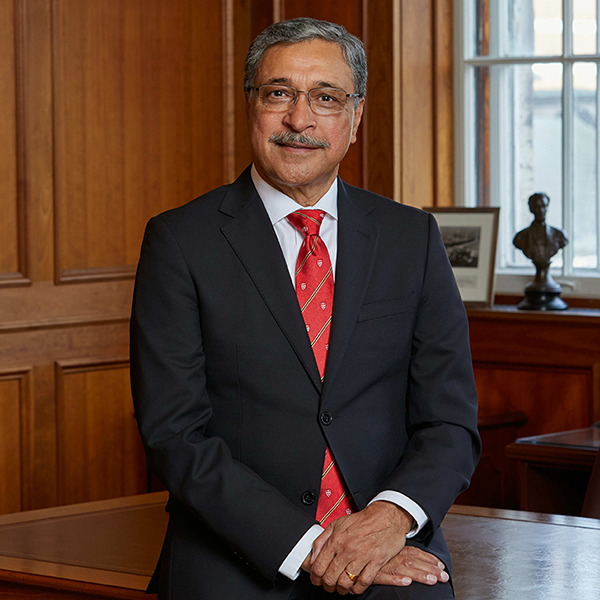When Alexa Dumont, a jazz performance student, first arrived at McGill, she wasn’t so certain that the label “international student” applied to her. The five-and-a-half-hour drive to Montreal from her home in Foxborough, Massachusetts, hadn’t seemed like such a big deal.
Shuaibo Huang’s path to McGill was a little more complicated.
After his plane took off from an airport close to his hometown of Harbin in China, he settled in for the long haul. After months of preparation — taking the SATs and language tests, getting his visa documents in order — he was on his way to Montreal to begin a new chapter in his life.
After a few hours in the air, though, “I realized that the direction of the flight was wrong.” An attendant soon announced the plane needed an engine repair. They would have to divert to Sichuan, a southern province in China, where the airline’s maintenance facilities were located. Huang wound up even further away from McGill than where he started.
When he finally did make it to Montreal, he joined Dumont and thousands of other students who travelled to McGill from 147 different countries, part of a group that comprises almost 11,000 members — and 27 per cent — of McGill’s student population.
Choosing McGill
Why do they come here?
Some of the reasons are common. McGill enjoys a reputation for high academic standards and consistently performs well in the various international rankings of universities (and, yes, prospective students from other countries pay very close attention to those rankings).
Montreal is a safe and affordable city with a unique Europe-meets-North-America vibe (parents tend to be particularly keen on those first two characteristics).
For Idil Üner, a psychology and economics student who has lived in Turkey, Thailand and Germany, it was McGill’s international culture that appealed to her. “I don’t think I would have been able to go to a school that didn’t offer that to me,” she says.
Dumont, one of the more than 2,300 McGill students holding an American passport, says her Montreal-based aunt helped sell her on the place. “I wanted to be in a city and be involved in everything that happens [there]. New York was such a big city that I felt lost, and Boston is like my hometown. I wanted something new.” Montreal fit the bill nicely, she says.
Celine Poisson, an economics and Hispanic studies student from New York, had her own reasons for choosing McGill and Montreal. She didn’t want to lose her French. Poisson had attended the bilingual Lycée française in New York (her parents trace their roots to France and Haiti).
Poisson is the co-president of the McGill International Student Network, a student-run group that organizes social and cultural events for international students and offers language classes taught by student volunteers.
Psychology student Gul Saeed is MISN’s other co-president and she sees the diversity of McGill’s student body as a definite source of strength. “Coming here, no one really stares at you because you’re different,” Saeed says. Her family moved from Pakistan to Japan, and Montreal has offered her a chance to reconnect with her roots; there is a stronger Pakistani presence in this city than there was in Japan.
Huang, a computer science and psychology student, says his original plan was to go to an American university — until he noticed the lower tuition rates at top Canadian schools. “That definitely played a huge role in my decision,” he says.
Depending on the program, the tuition rates at McGill for international students compare very favourably with those at U.S. universities of similar quality. “In some cases, we’re a great deal,” says associate registrar Jocelyn Younan.
Huang considered both the University of Toronto and McGill before opting for the latter. “I decided to come to McGill and to Montreal because it’s so diverse, you get to see so many different people, and you’re basically in Europe, right?”
He isn’t the only student from China making that choice. This year, for the first time, China overtook France as the country that sends the second highest number of international students to McGill (the U.S. is still in top spot).
This shift has been a long time coming. “We’ve been [recruiting in China] for years,” says registrar Kathleen Massey, who recently travelled there herself on a recruitment mission. McGill uses WeChat, a messaging app popular in China, to answer questions from prospective students there. As China’s middle class expands, more families have the means to send their children to universities in other countries. “They seem to value an international education in English-language universities,” says Massey.
Getting settled

International students do have to make some adjustments once they begin their studies here.
“I was definitely prepared for the weather,” says Huang — Harbin is known for its snow and ice festival. Language was more of an issue than he expected, though. His English was strong, but he soon discovered awkward gaps in his knowledge. “Some of the vocabulary that you learn [in China] — it’s not really practical,” he says. “You wouldn’t learn what the difference is between a donut and a bagel. They were the same thing to me!”
Üner misses her family, but regularly talks to her parents on Skype. “With technology right now, it’s easy,” she says.
Every student adapts differently, says Pauline L’Ecuyer, the director of International Student Services at McGill. “We can have students coming to McGill from Rouyn-Noranda who might have a bigger culture shock than a student coming from Shanghai,” she says. A lot depends on how widely travelled the students are. Students with a previous international experience under their belts have an easier time of it.
L’Ecuyer’s office oversees a buddy program that pairs new international students with an upper-year McGill student. This year, more than 700 volunteers have been helping 1,600 new international students adjust to Montreal.
“Pretty much all of our volunteers are doing this because they met a buddy when they arrived, and they said it made such a big difference in how they found their way around campus and around Montreal — and in developing their sense of belonging to the community,” says L’Ecuyer.
Reaching out to the world

Massey’s student recruitment team visited 13 American states and 20 different countries in 2016. While jet-setting around the world might sound glamorous, recruitment can be exhausting work; there are school visits during the day and information sessions and events in the evening. “[Recruiters] always have to be on,” Massey says.
With limited resources, the recruitment team has to think carefully about where to focus their efforts. They pay close attention to demographic trends and adjust accordingly. For example, prospective students in the American Southwest and in Texas may see more of McGill recruiters as the number of university-aged people in those regions increase. A virtual recruitment session via webinar is held for potential students who live in areas that McGill recruiters aren’t able to visit.
Whether a recruiter is in Beijing or Baie d’Urfé, the fundamental message is always the same, Massey says. Prospective students are interested in McGill’s high academic standards (and its performance in the various university rankings), its admission requirements, and financial aid opportunities (unlike many universities, McGill makes its merit-based and need-based financial aid available to international students). They’re also increasingly interested in finding out about research opportunities at the undergraduate level.
And, of course, they want to find out about Montreal — and the notorious Canadian winters. Recruitment officers carefully explain how it’s possible to thrive outdoors in the winter and that polar bears don’t compete with pedestrians for sidewalk space. “We do get that question!” Massey says. Not everyone knows where Montreal is, she notes — or that it’s well south of the polar bear’s natural range.
Though international students pay significantly higher tuition rates, most of the revenue is redistributed by the provincial government to all universities in the province.
“What motivates us in recruiting international students is a real interest in being an intellectually, culturally, linguistically diverse environment,” says Massey.
Classroom discussions tend to be more complex when the students in a course come from different places and have had different experiences in life, says Dean of Students Chris Buddle. A conversation about Canada-U.S. relations, for instance, “becomes more real when you’re sitting next to someone from Illinois or South Carolina.”
“Coming to McGill and getting to meet every type of person was really eye-opening. You get to meet the person and not the stereotype,” Poisson says. Huang thinks he might upend clichéd notions that some people who meet him have about students from China — that they’re super-serious bookworms, for instance. “I go out with my friends a lot and I’m really open to different experiences.”
Montreal benefits from the presence of international students in other ways too. A recent report from the Board of Trade of Metropolitan Montreal noted that international students make major contributions to the city’s economy, spending almost $540 million a year on housing, food, clothing and other items.
The presence of international students at the graduate level can also change the dynamic in McGill’s research labs, says Buddle. The research interests of many international students are influenced by the issues confronting their countries of origin. “We have students who come with the hopes of learning at McGill and then taking that knowledge back to their home country.”
Making a new home
Sometimes, though, international students decide to stick around after they graduate. Texas-born musician Win Butler, BA’04, stayed and co-founded the Grammy-winning band Arcade Fire. Carlos Leitão, BA’79, a native of Portugal, planted roots here and eventually became Quebec’s finance minister. The Aldo shoe store empire and the Juliette & Chocolat restaurant chain were both created by McGill graduates who chose to live in Montreal after coming from different countries (Moroccan-born Aldo Bensadoun, BCom’64, LLD’12, and Brazilian-born Juliette Brun, BA’02, respectively)
Mehrsan Javan, PhD’15, travelled to McGill from Iran to do his doctoral studies in engineering. His research on computer vision led to new techniques for the growing field of sports analytics — the techniques that Javan devised gather very detailed data about the hundreds of different plays that take place in a typical hockey game. He stayed in Montreal after completing his degree and co-founded Sportloqiq, which now counts several NHL teams among its clients.
Javan says he had many reasons for remaining in Montreal and some were personal (his now-fiancée was still working on her PhD). “You cannot start a business without having a good network of people,” he says. “Almost all of the amazing people that I have met during my PhD studies are Montreal-based,” including his Sportloqiq partner Craig Buntin, MBA’13. “Montreal is going to be a Canadian startup hub,” he adds. “There are lots of financial sources for early startups in the city.”

Nathon Kong, BSc(AgEnvSc)’07, came to McGill because he wanted to continue his education in English after finishing high school in India. (His family is from Thailand.) After graduating, he worked in the biotech and healthcare sectors before deciding to strike out on his own with Tailor2Go, a mobile custom tailoring service housed in a van equipped with a 3D scanner for very precise measurements. Kong’s business has won an armful of entrepreneurship awards.
As he neared the completion of his McGill degree, he wrestled with the question of what to do next. A degree from McGill would have opened doors for him back home, he says, but he had grown fond of Montreal and had a new network of friends here. “I like challenges,” he says of his decision to stay. “I wanted to make a contribution here.”
The Quebec government is hoping that more international students will make the same choice that Javan and Kong did. As the province’s population gets older and birth rates drop, Quebec is on the lookout for new arrivals with valuable skills.
In its recent report on the contribution of Montreal universities to the Quebec economy, the Board of Trade of Metropolitan Montreal noted that, “with Quebec’s demographics, it will be difficult to compete with other major metropolitan areas without attracting and retaining more international graduates.”
The Quebec government will be collaborating with Montreal International on measures aimed at encouraging more international students to remain in the province. In announcing this initiative, Quebec immigration, diversity and inclusiveness minister Kathleen Weil, BA’78, BCL’82, LLB’82, noted that international students are already familiar with Quebec culture and have degrees from Quebec institutions. “They are the best we can get and we want them to stay and help our economy grow.”
The bottom line, says Montreal International president and CEO Hubert Bolduc, is that “organizations today look for talent, regardless if that’s someone who was raised in L’Île D’Orleans [near Quebec City] or someone who was born and raised in [France].”
Poisson has a job lined up in New York after graduation, but she thinks that she might not be done with Montreal just yet. “The diversity and the openness [are] the reasons why I’d love to come back and settle here.”
Huang says he is open to the idea of staying. “To be honest, I feel like now, I’m more used to this kind of lifestyle than the one I’d have if I go back to China.” As graduation approaches, he is planning his next move. One possibility is a graduate degree in counselling psychology.
He thinks he might like to work with immigrants and help them adapt to a new country and culture — just like he did when he got off his plane in Montreal nearly four years ago.


